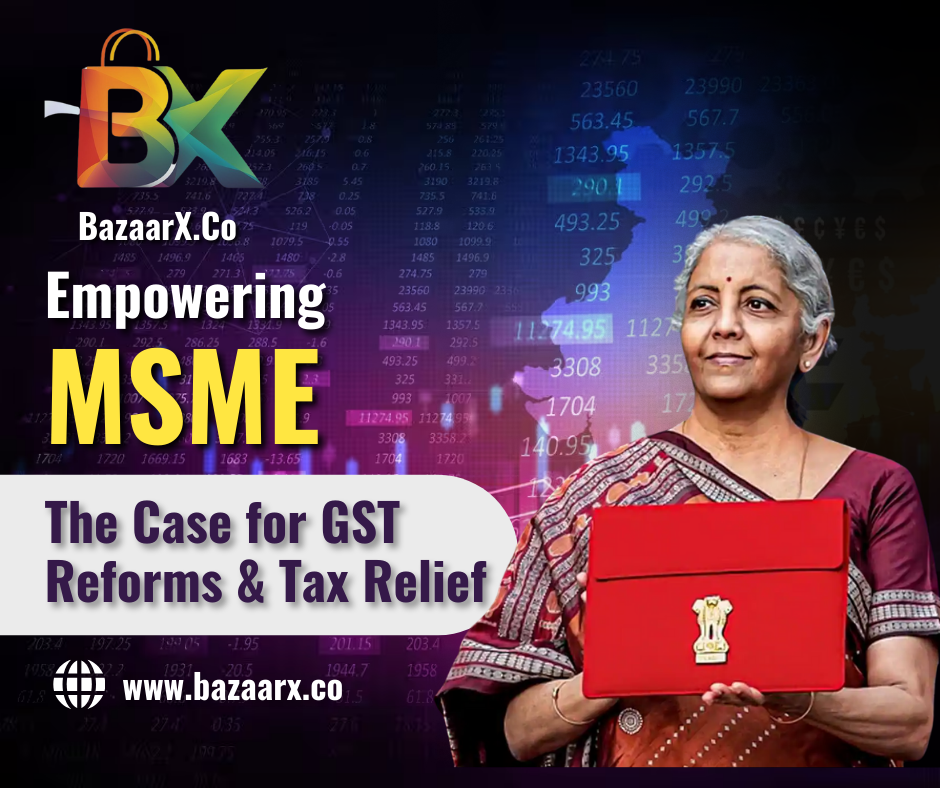Empowering MSMEs: The case for GST Reforms & Tax Relief

Introduction
Micro, Small, and Medium Enterprises (MSMEs) form the backbone of India’s economy, contributing nearly 30% to GDP and employing over 110 million people. Despite their importance, MSMEs continue to face hurdles such as high taxation, complex GST compliance, and regulatory bottlenecks.
With India aiming to become a $5 trillion economy, it’s time to rethink taxation policies and streamline compliance systems to empower small businesses. Finance Minister Nirmala Sitharaman has often emphasized the government’s commitment to MSMEs, but key reforms are urgently required.
This blog highlights three critical proposals that can transform the MSME landscape:
-
Reducing GST on essential items
-
Abolishing 18% GST on insurance premiums
-
Fully digitizing GST registration and eliminating redundant licenses
1. Reduce GST on Essential Items for MSME Relief
Currently, many essential items used by MSMEs in production and day-to-day operations attract GST slabs ranging from 5% to 18%. For small businesses with thin margins, this adds a heavy financial burden.
🔹 Why it matters:
-
High GST rates increase the cost of raw materials.
-
MSMEs pass this cost to consumers, reducing competitiveness.
-
Inflationary pressure makes Indian products less attractive in global markets.
🔹 Proposal:
-
Reduce GST on essential goods used in MSME operations to 3–5% maximum.
-
Provide targeted GST rebates for sectors like textiles, food processing, handicrafts, and logistics where MSMEs dominate.
🔹 Expected benefits:
-
Lower working capital stress.
-
Increased affordability for consumers.
-
Boost in exports by making MSME products more competitive.
Case in point: Countries like Vietnam and Bangladesh have lower indirect taxes on essential goods, which has strengthened their MSME-led exports. India must follow suit to keep pace in global trade.
2. Remove 18% GST on Insurance: Towards a 0% Tax Regime
At present, insurance premiums—including health and term insurance—attract 18% GST, making coverage costly for MSMEs and their employees.
🔹 Why it matters:
-
MSMEs often cannot afford to provide insurance for staff.
-
High GST discourages individuals from securing personal coverage.
-
In a country with low insurance penetration (less than 4% of GDP), such a high tax disincentivizes financial security.
🔹 Proposal:
-
Exempt insurance from GST (0% tax) or cap it at a nominal 2–3%.
🔹 Expected benefits:
-
Wider insurance adoption across MSME workforce.
-
Greater financial security for small entrepreneurs and employees.
-
Reduction in dependency on government schemes for medical or accidental claims.
Global Perspective: In most developed economies, insurance is either tax-free or taxed at nominal rates as it is treated as a necessity, not a luxury. India must adopt a similar approach to build a more secure and resilient workforce.
3. 100% Digital GST Registration & Removal of Local Trade Licenses
GST was introduced in 2017 to create a “One Nation, One Tax” system. However, MSMEs still face significant compliance hurdles:
-
Multiple layers of verification.
-
Local trade license requirements.
-
Offline processes that vary from state to state.
This defeats the very purpose of GST simplification.
🔹 Proposal:
-
Make GST registration 100% digital across India.
-
Abolish local trade license requirements once GST is obtained.
-
Introduce a single national digital ID for MSMEs to avoid duplication across states.
🔹 Expected benefits:
-
Saves time, money, and effort for entrepreneurs.
-
Eliminates corruption and delays in local licensing.
-
Encourages more MSMEs to enter the formal economy.
Real-life impact:
For a small trader in Tier-2 cities like Indore or Coimbatore, the current system requires running between municipal offices and GST departments. A fully digital setup would let them start operations in days, not months.
Why These Reforms Are Crucial Now
India’s MSMEs are still recovering from the shocks of COVID-19, inflation, and global supply chain disruptions. To sustain growth:
-
They need lower taxes to reduce financial strain.
-
Ease of compliance is essential to attract young entrepreneurs.
-
A supportive insurance ecosystem will strengthen resilience.
If implemented, these reforms can add 1–1.5% to India’s GDP and create millions of new jobs, making India a truly MSME-driven powerhouse.
Call to Action
As MSMEs, industry bodies, and associations, it is time to unite and urge the Finance Ministry to take swift action.
📌 Our demands:
-
Reduce GST on essential items.
-
Abolish 18% GST on insurance premiums.
-
Implement 100% digital GST registration with no local licenses.
👩💼 With Nirmala Sitharaman’s leadership, we hope the upcoming policy reforms will reflect the voice of small businesses—because empowering MSMEs means empowering India’s future.
Conclusion
MSMEs are not asking for favors—they are asking for fair reforms that allow them to thrive, innovate, and compete globally. With rationalized GST, zero tax on insurance, and a simplified digital-first compliance process, India can unlock the true potential of its entrepreneurial spirit.
👉 The time for reform is now. Let’s ensure our policymakers hear the voices of India’s growth drivers—our MSMEs.
